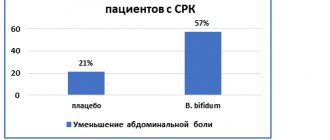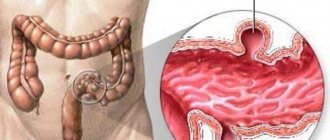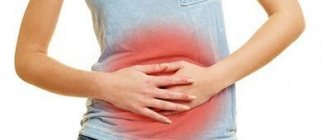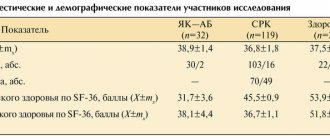Are you suffering from abdominal pain, cramps and constant bowel movements? Unpleasant sensations in the intestinal area can ruin all plans, so we use various medications to relieve abdominal discomfort. But these measures only allow you to temporarily get rid of the symptoms of a serious disease, which return again and again. What if these symptoms have a single cause - irritable bowel syndrome? What this disease is, what its symptoms are and how to cure it, we will tell you in this article.
What is irritable bowel syndrome?
This is a disorder of the intestines and discomfort in the abdomen during bowel movements. The syndrome itself is not a disease, but rather a set of symptoms that often occur for an unknown reason. Unfortunately, such a disorder can significantly reduce a person’s quality of life, forcing him to remain in an uncomfortable state: digestion is disrupted, metabolic processes in the body worsen, and the saturation of the human body with nutrients decreases.
Irritable bowel syndrome is a very common occurrence among people aged 25 to 40 years. Statistics show that at least once in their life, every third person has experienced the unpleasant symptoms of irritable bowel syndrome.
Self-medication in this case can be very dangerous to health. The fact is that the syndrome is treated comprehensively and under the close attention of the attending physician. The consequence of self-medication can be intestinal obstruction and numerous chronic gastrointestinal diseases. With the first signs of irritable bowel syndrome, you should contact a therapist, who will refer you to a more specialized specialist - a gastroenterologist. The diagnosis is usually made only after excluding tumors and inflammatory changes in the intestines.
The intestines are where food is digested and nutrients are obtained by the body. When food enters the intestines, it moves along the intestines. This process of advancement is achieved through the work of smooth muscle cells within the intestinal walls. The cells alternately contract and relax. But when IBS (irritable bowel syndrome) appears, cell function is disrupted. Food begins to pass through the intestines either too quickly or too slowly. The result is discomfort and constipation or diarrhea.
How the intestines work
The intestine is represented by two main sections: thin and thick. The small intestine begins with the duodenum, then passes into the jejunum and then into the ileum, ending with a special valve - the ileocecal valve, this is the border that separates the small intestine from the large intestine. Next, the large intestine is divided into three sections: the cecum, colon and rectum. The role of the intestines is difficult to overestimate, because it is in it that nutrients are absorbed from food, due to which our body exists. Our intestines also remove toxins, breakdown products, and undigested food.
Good to know
The entire surface of the intestine is populated by living microorganisms, they lead vigorous life activities, multiply, die, and perform a huge number of useful functions. Not only the functioning of the digestive system, but also the health of the entire organism depends on the quantitative and qualitative composition of microflora. An interesting fact is that there are no bacteria in the duodenum; they die due to the acid coming from the stomach, but about 300 varieties of microorganisms “live” freely in the sections of the large intestine, including fungi, protea, protozoa, bifidobacteria and others. Normally, the number of pathogenic microorganisms should not exceed 1% of the total number.
Symptoms of irritable bowel syndrome
- nausea and gag reflex;
- flatulence with copious release of gases;
- abdominal pain or cramps;
- constant bloating;
- stool disorders - constipation or diarrhea;
- pain in the lower abdomen;
- sleep disturbance;
- increased heart rate;
- increased fatigue;
- long digestion of food;
- the appearance of mucus in the stool;
- false urge to defecate;
- loss of appetite.
Also, the disease is often accompanied by symptoms that, at first glance, are not characteristic of intestinal pathologies: headaches, discomfort in the spine and muscles, weight loss and abdominal swelling. All these symptoms are not constant, they can disappear and reappear over time. Unpleasant sensations most often appear after each meal, and then become less pronounced.
Classification of diseases
Duodenitis is a disorder of the function of the duodenum.
Depending on the location of the source of inflammation, painful processes in the intestines are usually classified as follows:
- Enteritis. This term refers to inflammation of the small intestine (both all at once and any individual section).
- Duodenitis. This name refers to dysfunction of the duodenum.
- Mesadenitis. In such diseases, inflammation affects only the lymph nodes located in the intestines (the painful process itself, as a rule, is caused by infection).
- Colitis. This general term is usually used to describe inflammatory processes in the large intestine. Moreover, either the entire organ or only its lower section can be affected. Colitis is also commonly called inflammation of the mucous membrane of the rest of the intestine.
Reasons for the development of the pathological phenomenon
- Nutrition. Eating fried, salty, sweet and fatty foods, as well as alcohol-containing drinks, has a negative effect on digestion. In addition, modern people constantly snack on the run. Which also negatively affects intestinal function.
- Hormonal disbalance. More often, this reason is typical for women during periods of life such as pregnancy, breastfeeding, menopause, and the menstrual cycle. As for the menstrual cycle, during this period the amount of chemicals changes, and the problem begins to manifest itself more clearly.
- Impaired intestinal motility. If motor skills work in an accelerated mode, this leads to stomach upset and diarrhea. On the contrary, slow bowel movements can cause constipation. As a result, pain leads to a sharp contraction of muscles.
- Emotional stress: stress, depression, anxiety, fatigue.
- Past diseases of the gastrointestinal tract. Infections that cause gastrointestinal diseases can subsequently affect the functioning of the entire intestine.
Why does inflammation occur?
Inflammation is the death of mucosal cells.
Before answering this question, you need to understand how this painful process generally proceeds.
From a medical point of view, any inflammation is the death of cells of the mucous membranes, accompanied by abundant blood supply to the affected area.
This process is accompanied by inevitable disruptions in the functioning of the “injured” organ and, as a consequence, pain.
The role of the factor that provokes the problem, as a rule, is various harmful organisms. When it comes to intestinal inflammation, it is usually:
- worms and other parasites;
- pathogens (viruses and microbes);
- other pathogenic flora.
Of course, other negative factors can also be the cause of the violation. Among them are:
- autoimmune diseases leading to spontaneous rejection of cells from the mucous membrane of the large intestine;
- genetic predisposition, in other words, an inherited lack of digestive enzymes, causing problems with the gastrointestinal tract;
- poor nutrition, which provokes chemical and mechanical damage to the mucous membranes of the organs involved in the digestive process (usually through the consumption of excessively spicy or fatty foods);
- atherosclerotic abnormalities, due to vasoconstriction, inevitably leading to disruption of the blood supply to the intestinal walls.
The following video will tell you about the symptoms and treatment of colitis:
Diagnosis of irritable bowel syndrome
If you have all the symptoms of the disease listed above, consult a physician. He will conduct an initial examination and refer you to a gastroenterologist. The purpose of primary diagnosis is to exclude the presence of other life-threatening diseases: tumors, inflammatory processes, growths, infectious diseases.
When visiting a doctor, you need to provide a complete medical history, report the presence and frequency of symptoms, and talk about the presence of chronic diseases. After examination and palpation (feeling), the specialist will refer you for laboratory tests, including:
- General blood analysis. The analysis allows you to determine whether an inflammatory process is present in the body, as well as to determine possible anemia.
- General urine analysis. Determines the presence or absence of blood and parasites in the patient’s body, which allows us to talk about the development of a number of intestinal diseases other than irritable bowel syndrome.
- Blood test for celiac disease. A specific blood test that allows you to identify a disease of the digestive system (celiac disease), in which the intestines cease to properly digest incoming food, which is accompanied by diarrhea.
- Colonoscopy. This is an examination of the colon from the inside using a special device (colonoscope).
- Magnetic resonance imaging of the pelvis and abdomen. This is a non-invasive examination method that allows you to study the structure and condition of the organs and tissue of the pelvis in men and women using magnetic waves.
After all the studies have been carried out and all other intestinal diseases have been excluded, the doctor begins treatment and prescribes complex therapy, based on the patient’s medical history.
Main causes of intestinal diseases
- predisposition can be inherited;
- unbalanced diet;
- low-quality products;
- increased psycho-emotional stress;
- living in places with poor ecology;
- work in hazardous production;
- intestinal infections;
- taking strong medications;
- deficiency of vitamins, micro and macroelements;
- deviations from the physiological norm of body weight, both thinness and overweight;
- presence of bad habits;
- physical inactivity.
The main reasons, as you can see listed above, depend on lifestyle and can be corrected, with the exception of heredity.
9 out of 10 people on the planet have problems with the digestive tract, expressed in one form or another. For example, today every fifth patient examined is diagnosed with IBS, and the female half suffers 4 times more often, and the bulk of patients are people over 30 years of age.
Treatment of irritable bowel syndrome
Therapy for IBS should be carried out comprehensively in several stages. The treatment regimen depends on the individual characteristics of the body, the degree and time of the pathology. Most often, drug therapy is prescribed, which is supplemented by a special diet. In the absence of comprehensive treatment, symptoms will reappear from time to time.
The medications that the doctor prescribes for the treatment of IBS not only eliminate painful symptoms, but also improve the condition of the digestive system, and also prevent relapses and complications. When treating diarrhea syndrome, medications with antimicrobial properties are prescribed. They relieve irritation of intestinal tissues, stop excess flatulence and restore normal intestinal function.
When treating IBS with constipation, the use of natural medicines is indicated that eliminate difficulties with defecation, have a gentle effect on inflamed intestinal tissue and free it from feces. May be in the form of chewable tablets or rectal suppositories.
If the appearance of IBS is associated with neurological disorders, antidepressants are prescribed - they normalize the functioning of the nervous system and improve the psycho-emotional state.
To relieve pain, painkillers and antispasmodics are used - they relax muscle fibers and tissues that are in hypertonicity.
Diet for irritable bowel syndrome
The diet for IBS depends on what symptoms accompany the pathology. If you experience frequent constipation, you should exclude dry, salty foods from your diet. For diarrhea, avoid liquid foods, vegetables, and fruits.
If you suffer from flatulence, you should limit dairy products, nuts, and beans. If there is severe pain in the intestines, fatty, salty, and heavy foods are not allowed.
At the Medunion clinic you can undergo a full examination and treatment of irritable bowel syndrome. We employ practicing doctors with over 10 years of experience. In the diagnostic room you can take all tests and undergo hardware examination in a comfortable environment. For our clients there is a special offer “doctor at home”. If you are unable to visit our medical center yourself, a doctor will come to you and conduct an examination at home.
Take care of your health and make an appointment with a multidisciplinary medical center directly on our website.
Treatment of pain in the intestines on the right and left lower abdomen
To determine the cause of severe pain in the intestines on the left and right side of the lower abdomen, the patient should visit a doctor. After the initial examination and consultation, the patient will be sent for testing. A general analysis of blood, urine and feces will show the internal indicators of the body and demonstrate the presence of any abnormalities in the systems of the human body.
For clearer results, the patient is referred for a bacteriological examination of stool, colonoscopy and endoscopic examination. After receiving the test results, the attending physician prescribes treatment for the patient. A medical expert prescribes medication, homeopathic or surgical intervention in advanced cases.
If necessary, to obtain information about the condition of the internal organs, the doctor refers the patient to undergo a computed tomography or ultrasound scan. These diagnostic tests are not recommended for pregnant women, nursing mothers, and children under sixteen years of age. Health care professionals do not recommend these procedures for certain groups of the population. The use of radiation and contrast fluid can negatively affect healthy organs.
To make an appointment for a consultation or examination at the private clinic “KDS Clinic”, leave a request on the website and managers will contact you as soon as possible.
Preventive measures
You should always wash your hands before eating.
Like any disease of the gastrointestinal tract, intestinal inflammation can be easily avoided if you follow simple hygiene rules from childhood.
For example, keep your hands clean and wash food before eating. However, in practice, adherence to the banal principles of proper nutrition is no less important. What are they?
If the patient is already aware of the tendency of his intestines to inflammation, it would not be superfluous for him to completely review his diet in order to prevent the disease from becoming chronic. The most rational steps in this sense would be a complete rejection of any exotic food and reasonable restrictions on the use of spicy seasonings.









